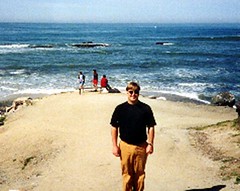Today's title theme song was written by a very good friend; I reiterate, "This is NOT a Rebel song!"
I never had no silver spoon
I went to school in an old saloon
I don't smoke, just dip and chew and spit
Meat and taters fit my bill
The Dukes of Hazzard gave me chills
And I'm still mad at Lee because he quit.
For me and my kind Dixie's more than just a word
To say the South won't rise again is plain absurd
Life without a truck is worse than doing time
As long as Hank is on the stage
As long as there is Jack to age
As long as wars for deer are waged
Then there will be hell to raise
For me and my kind.
Daddy told me long ago
"Son, when you die, you will go
To the capital of Tennessee"
Well, I swear that before I go
I'll let every Yankee know
That you can't tame or change a bird that's free.
Yes sir, nothing suits me more
Than the Rebel flag that soars
In the wind if only to remind
That country boys they will survive
God bless beer and four-wheel drive
That's the life for me and my kind.
For me and my kind . . .
Copyright 1991 John Brocato
Now the problem with solely race-based civil rights and at that a singular race is that they tend to overly favor those who do not need a helping hand. For example, many of the African American students I attended Harvard with starting in 1981 came from families with mid to high level six figure incomes, the kind of black elite who summer at Oak Bluffs on the Vineyard(cf Graham and Moore). I in no way deny that one can be African-American, well-to-do, and still have been discriminated against regularly. But I'm not sure the wealthy, prep-school educated son or daughter of a high ranking UN administrator who has never wanted for anything is what Affirmative Action should be about.
Rather I think we should have some other affirmative action components based on familial income, and some that seek out targeted non-African American minorities who are having a hard time in the US: say Vietnamese boat people along the Gulf Coast, Sudanese lost boys in Minneapolis, and Hmong villagers in Suburban Detroit, naming but three powerful exemplars.
I'm not a Lawyer or even a constitutional scholar, though I did study under Archibald Cox (who knew a thing or three), and I'm not here to re-argue Bakke or later Michigan cases. But I've read Agee and seen Evans' pictures. I know what happened in Muskogee and later the Central Valley between Modesto and Bakersfield. I've seen Matewan, and I do firmly believe that we have real class issues in the States that we have been denying since at least the 30s when effective labor and left political movements began dying off en masse. That's what Bragg (Rick and Billy!) is talking about.
We Liberals need to be tougher to borrow the adjective my former housemate applied to Alfred Shanker (cf. Kahlenberg). We need to engage those anywhere to the right of us with language and arguments they understand, so they can't just dismiss our ideas rotely out of hand as airy fairy left-wing fantasies. Liberals need to work on facts, figures, and specific proposals with limited targeted goals that are numerically measurable. Using such arguments we might actually start addressing the daunting problems which face our country, so many of which are about class and income and a result of the vast shift of capital away from labor over the past say 30+ years. Why do the highest incomes belong to those who produce nothing?
Remember Liberal is a seven letter word not four.
BIBLIOGRAPHY
Graham, Lawrence Otis. Our Kind of People: Inside Black America's Upper Class. NY: Harper Perennial, 1999.
Kahlenberg, Richard. Tough Liberal: Albert Shanker and the Battles Over Schools, Unions, Race, and Democracy. New York: Columbia University Press, 2007.
Moore, Jacqueline M.Leading the Race: The Transformation of the Black Elite in the Nation's Capital, 1880-1920. Charlottesville and London: University Press of Virginia, 1999.

No comments:
Post a Comment